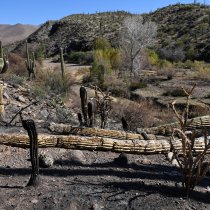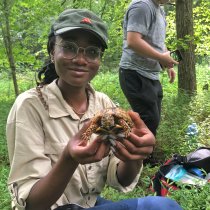Learning to train the next generation of data scientists
April 21, 2016
In late January 2016, Megan Jones, a NEON staff scientist and science educator participated in a Software Carpentry & Data Carpentry Instructor Training Workshop, hosted at University of Florida’s Informatics Institute. Read on to learn more about her experience and takeaways from the workshop.
Tell us about Software Carpentry and Data Carpentry
Software Carpentry (SWC) and Data Carpentry (DC) are two non-profit, mostly volunteer organizations with near-global reach focused on helping scientists of all types with computing and data skills. SWC focuses on scientific computing basics (command line/shell, version control, and programming in several languages) while DC focuses on fundamental skills and tools for working with data. Currently, DC lessons are focused on ecology and genomics with ongoing development of lessons in other domains.
What was the format of this workshop?
It was a hands-on two day workshop that was co-led by Greg Wilson, founder of Software Carpentry, and Tracy Teal, Executive Director of Data Carpentry. Many of the participants had an ecology background, but the training included individuals in citizen science (particularly museum/herbarium collections) and library sciences. All 24 trainees were there to learn how to become volunteer instructors for SWC and DC. The workshop covered the basics of educational psychology and instructional design, as well as how to apply these concepts in teaching both intensive workshops and regular classes.
Why become an SWC or DC instructor?
While I have experienced teaching in university classrooms and outdoor settings, this training was the first time that I had seen or been involved in using live coding while teaching. And, most of our Data Skills workshops and Institutes involve teaching coding live with the audience. The skills that I learned, and will continue to hone as a volunteer instructor with SWC and DC, will directly translate back to the workshops and courses that I develop and present on NEON’s behalf.
Tell us more about NEON’s Data Skills program
NEON produces and provides heterogeneous, spatio-temporal open-access data for the scientific community to use. For ecologists, climate scientists and others to use the data they must be comfortable using different platforms and programs to manage, manipulate and analyse the data to answer their research questions. Some of these data skills are relatively new in the world of ecology. The NEON Data Skills team is currently focused on creating workshops, self-paced tutorials, and courses for scientists of all levels and disciplines to learn the skills needed to work with NEON and other external data. We do not want to duplicate efforts that are already established to teach basic computer science skills like those of Software Carpentry or Data Carpentry. By collaborating with SWC and DC, we can make sure that our efforts at NEON build upon existing foundational skills to provide more discipline-focused, data-centered educational materials for the users of NEON data.
Any highlights to share from your experience?
When I arrived in Florida, I met one of the other attendees, a post-doc student at University of Florida, who had just been searching for information on how to work with raster data. Through a general search he came across the NEON tutorials on using raster data and figured out how to do exactly what he wanted to do. He was so excited about the NEON Data Skills tutorials and having more NEON data coming down the pipeline! It was cool to see people in the community organically finding the resources we’ve been working on and finding them useful.
It was also rewarding to spend time with 25 other people who felt that these types of skills are important enough that they are willing to volunteer their time to build and maintain lessons as well as give trainings.
What’s next as a result of this workshop?
I am working through the certification process to become both a SWC and a DC instructor. After that I hope to help with local workshops that are to be offered. The skills I’ve learned will directly contribute to both the development of NEON Data Skills tutorials and teaching NEON workshops including two upcoming at the 2016 ESA conference.


